40 start with O start with O

A contemporary edition and translation of one of the great monuments of Old English literary and religious culture.
The homilies of the monk Ælfric, written in the last decade of the tenth century, offer some of the most important prose writing in Old English. They convey mainstream Christian thought at the turn of the millennium, a distillation of the spiritual inheritance of the English Church before the Norman Conquest and during a time of monastic reform. The homilies cover a broad range of topics, from biblical exegesis to saints’ lives to general Christian history, with a strong focus on the Gospel reading at Mass, explained in language that laypeople could understand. Ælfric is famous for his lucid prose, which he later developed into a rhythmical and alliterative style that has often been likened to verse.
In his first series of Catholic Homilies, Ælfric drew on the works of Church Fathers such as Augustine, Gregory, and Bede to create forty sermons for use throughout the church year. This is the first complete translation of the Catholic Homilies since 1844, presented alongside the newly edited Old English text.






The Book of Pastoral Rule, or Liber regulae pastoralis, by Pope Gregory the Great—the pontiff responsible for the conversion of the English to Christianity beginning in 597—is a guide for aspiring bishops. Pope Gregory explains who ought and who ought not seek such a position and advises on what sort of spiritual guidance a bishop should provide to those under his direction.
The Old English Pastoral Care, a translation of Gregory’s treatise completed between 890 and 896, is described in a prefatory letter by King Alfred the Great as his own work, composed with the assistance of his bishops and chaplains. It appears to be the first of the Alfredian translations into Old English of Latin texts deemed necessary for the revitalization of the English Church, which had been ravaged by the depredations of Scandinavian invaders during the ninth century and by the decline of clerical competence in Latin.
This new edition and translation into modern English is the first to appear in a century and a half.
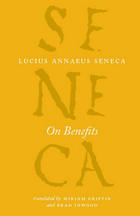
Lucius Annaeus Seneca (4 BCE–65 CE) was a Roman Stoic philosopher, dramatist, statesman, and advisor to the emperor Nero, all during the Silver Age of Latin literature. The Complete Works of Lucius Annaeus Seneca is a fresh and compelling series of new English-language translations of his works in eight accessible volumes. Edited by world-renowned classicists Elizabeth Asmis, Shadi Bartsch, and Martha C. Nussbaum, this engaging collection restores Seneca—whose works have been highly praised by modern authors from Desiderius Erasmus to Ralph Waldo Emerson—to his rightful place among the classical writers most widely studied in the humanities.
On Benefits, written between 56 and 64 CE, is a treatise addressed to Seneca’s close friend Aebutius Liberalis. The longest of Seneca’s works dealing with a single subject—how to give and receive benefits and how to express gratitude appropriately—On Benefits is the only complete work on what we now call “gift exchange” to survive from antiquity. Benefits were of great personal significance to Seneca, who remarked in one of his later letters that philosophy teaches, above all else, to owe and repay benefits well.
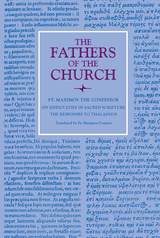

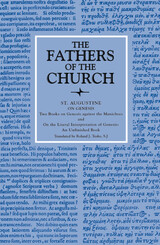
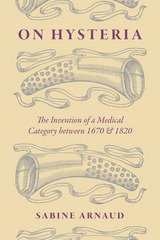
In On Hysteria, Sabine Arnaud traces the creation and rise of hysteria, from its invention in the eighteenth century through nineteenth-century therapeutic practice. Hysteria took shape, she shows, as a predominantly aristocratic malady, only beginning to cross class boundaries (and be limited to women) during the French Revolution. Unlike most studies of the role and status of medicine and its categories in this period, On Hysteria focuses not on institutions but on narrative strategies and writing—the ways that texts in a wide range of genres helped to build knowledge through misinterpretation and recontextualized citation.
Powerfully interdisciplinary, and offering access to rare historical material for the first time in English, On Hysteria will speak to scholars in a wide range of fields, including the history of science, French studies, and comparative literature.
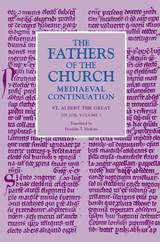

The first complete English translation of a controversial Renaissance debate centering moral questions on power and leadership.
Poggio Bracciolini was a prominent scholar-official of the early Renaissance and a leading representative of Florentine humanism. He was employed as a secretary to seven popes and ended his career as Chancellor of the Republic of Florence. On Leaders and Tyrants contains texts, the majority by Poggio, relating to a controversy on the relative merits of the lives and deeds of Scipio Africanus and Julius Caesar. The debate addressed the nature of tyranny and military glory, as well as the qualities necessary for republican leaders, such as Stoic virtue, lawfulness, and good citizenship. Poggio’s primary opponent was the educator Guarino of Verona, a humanist in the service of the duke of Ferrara. The psychology of power, the demands placed on public servants, and the dividing line between leadership and tyranny are as topical today as they were when Poggio wrote. This volume contains a fresh edition of the Latin texts and the first complete translation of the controversy into English.

Jacopo Zabarella's two treatises On Methods and On Regressus (1578) are among the most important Renaissance discussions of how scientific knowledge should be acquired, arranged, and transmitted. They belong to a lively debate about the order in which sciences should be taught and the method to be followed in scientific demonstration that roiled the Late Renaissance world for decades. In these famous works Zabarella rejected the views of Ramists and modern Galenists in favor of the pure doctrine of Aristotle, freed from misunderstandings foisted upon it by medieval interpreters. The influence of these works on Galileo's scientific method and Descartes' famous Discourse on Method (1637) has long been debated. They are here translated into English for the first time, along with a new Latin text based on the corrected 1586 edition.
Volume 1 contains On Methods, Books I-II. Volume 2 contains On Methods, Books III-IV, and On Regressus.

Jacopo Zabarella's two treatises On Methods and On Regressus (1578) are among the most important Renaissance discussions of how scientific knowledge should be acquired, arranged, and transmitted. They belong to a lively debate about the order in which sciences should be taught and the method to be followed in scientific demonstration that roiled the Late Renaissance world for decades. In these famous works Zabarella rejected the views of Ramists and modern Galenists in favor of the pure doctrine of Aristotle, freed from misunderstandings foisted upon it by medieval interpreters. The influence of these works on Galileo's scientific method and Descartes' famous Discourse on Method (1637) has long been debated. They are here translated into English for the first time, along with a new Latin text based on the corrected 1586 edition.
Volume 1 contains On Methods, Books I-II. Volume 2 contains On Methods, Books III-IV, and On Regressus.
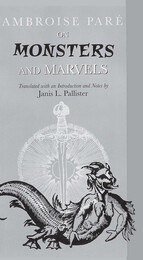

On Morals or Concerning Education is an exhortation on the importance of education by the prolific late-Byzantine author and statesman Theodore Metochites (1270–1332), who rose to the aristocracy from a middle-class background but fell from favor late in life and died as a monk. As a manual of proper living and ethical guidance, the treatise offers unique insights into the heightened roles of philosophy and rhetoric at a time when the elite engaged intensely with their Hellenic heritage, part of a larger imperial attempt to restore Byzantium to its former glories.
On Morals probes hotly disputed issues in fourteenth-century Byzantine society, such as the distinction between the active and contemplative life and the social position of scholars. Metochites’s focus on the character and function of Christian faith also reflects ongoing debates regarding the philosophy of religion. Occasional autobiographical digressions offer fascinating glimpses of Metochites’s distinctive personality.
This volume provides the full Byzantine Greek text alongside the first English translation of one of Metochites’s longest works.

Three late dialogues.
Cicero (Marcus Tullius, 106–43 BC), Roman lawyer, orator, politician and philosopher, of whom we know more than of any other Roman, lived through the stirring era that saw the rise, dictatorship, and death of Julius Caesar in a tottering republic. In his political speeches especially and in his correspondence we see the excitement, tension and intrigue of politics and the part he played in the turmoil of the time. Of about 106 speeches, delivered before the Roman people or the Senate if they were political, before jurors if judicial, fifty-eight survive (a few of them incompletely). In the fourteenth century Petrarch and other Italian humanists discovered manuscripts containing more than 900 letters of which more than 800 were written by Cicero and nearly 100 by others to him. These afford a revelation of the man all the more striking because most were not written for publication. Six rhetorical works survive and another in fragments. Philosophical works include seven extant major compositions and a number of others; and some lost. There is also poetry, some original, some as translations from the Greek.
The Loeb Classical Library edition of Cicero is in twenty-nine volumes.
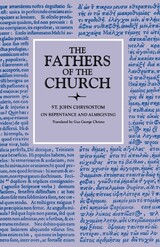
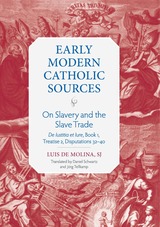
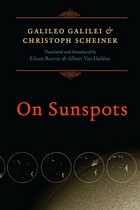
Galileo’s telescopic discoveries, and especially his observation of sunspots, caused great debate in an age when the heavens were thought to be perfect and unchanging. Christoph Scheiner, a Jesuit mathematician, argued that sunspots were planets or moons crossing in front of the Sun. Galileo, on the other hand, countered that the spots were on or near the surface of the Sun itself, and he supported his position with a series of meticulous observations and mathematical demonstrations that eventually convinced even his rival.
On Sunspots collects the correspondence that constituted the public debate, including the first English translation of Scheiner’s two tracts as well as Galileo’s three letters, which have previously appeared only in abridged form. In addition, Albert Van Helden and Eileen Reeves have supplemented the correspondence with lengthy introductions, extensive notes, and a bibliography. The result will become the standard work on the subject, essential for students and historians of astronomy, the telescope, and early modern Catholicism.

Antiquity’s most prolific and influential medical writer and practitioner.
Galen of Pergamum (129–?199/216), physician to the court of the emperor Marcus Aurelius, was a philosopher, scientist, medical historian, theoretician, and practitioner who wrote forcefully and prolifically on an astonishing range of subjects and whose impact on later eras rivaled that of Aristotle. Galen synthesized the entirety of Greek medicine as a basis for his own doctrines and practice, which comprehensively embraced theory, practical knowledge, experiment, logic, and a deep understanding of human life and society.
This volume presents three works of the greatest importance to Galen’s theory and practice of medicine. On Temperaments sets out Galen’s concept of the combination (krasis) of the four elemental qualities (hot, cold, wet, and dry), which is fundamental to his account of the structure and function of the human body and of animal and plant bodies generally, and is in turn essential to his theory of medical practice. The two related works, On Non-Uniform Distemperment and The Soul’s Traits Depend on Bodily Temperament, deal with specific aspects of dyskrasia, which is a disturbance in the combination of these qualities. Appended are two related short treatises, On the Best Constitution of Our Body and On Good Bodily State.
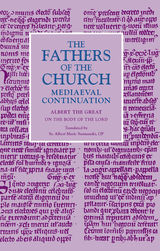
The overall movement of the treatise follows the order of God’s wisdom. Albert begins by discussing the Eucharist as a gift flowing from the goodness of the Trinity. He touches on its relation to redemption and the Church, including a rigorous Aristotelian analysis of Eucharistic change and presence before ending with a discussion of Mass rubrics. The most significant theological emphasis is on the Eucharist as food given to feed the people of God.
The style varies to suit the content: certain sections are terse; others are devotional, allowing the reader to enter the saint’s own prayer. Perhaps most characteristically Albertine is an extended meditation that compares the process of digestion to the incorporation of the Christian into the Body of Christ. The mixed style allows this work to integrate rigorous aspects of scholastic thought with a fervent love for God, making On the Body of the Lord one of Albert’s most human as well as one of his most beautiful works.
On the Body of the Lord was well received, particularly in areas that came to be influenced by the devotio moderna. By 1484, three separate Latin editions had been printed, two of which were the inaugural works on new presses. In the following century the Protestant Reformation brought an end to its popularity. On the Body of the Lord is here translated into English for the first time.

Antiquity’s most prolific and influential medical writer and practitioner.
Galen of Pergamum (129–?199/216), physician to the court of the emperor Marcus Aurelius, was a philosopher, scientist, and medical historian, a theoretician and practitioner, who wrote forcefully and prolifically on an astonishing range of subjects and whose impact on later eras rivaled that of Aristotle. Galen synthesized the entirety of Greek medicine as a basis for his own doctrines and practice, which comprehensively embraced theory, practical knowledge, experiment, logic, and a deep understanding of human life and society.
In the three classic works in this volume, On the Constitution of the Art of Medicine, The Art of Medicine, and A Method of Medicine to Glaucon, Galen covers fundamental aspects of his practice in a lucid and engaging style designed to appeal to a broad audience.


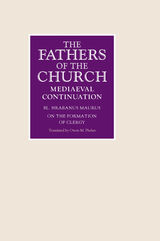
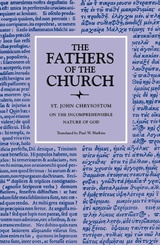
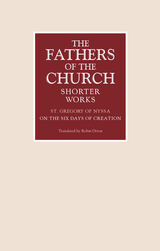


Meticulous eloquence.
Publius Aelius Aristides Theodorus was among the most celebrated, versatile, and influential authors of the Second Sophistic era and an important figure in the transmission of Hellenism. Born to wealthy landowners in Mysia in AD 117, he studied in Athens and Pergamum and had begun a promising oratorical career when in the early 140s he fell chronically ill and retreated to the healing shrine of Asclepius in Pergamum. There he began to follow a lifelong series of dream revelations and instructions from the god that inspired the six autobiographical books of Sacred Tales, an invaluable record of both temple therapy and personal religious experience published in the 170s. By 147 Aristides was able to resume his public activities as a member of the landed and gubernatorial elite and to pursue a successful oratorical career. Based at his family estate in Smyrna, he traveled between bouts of illness and produced speeches and lectures for both public and private occasions, declamations on historical themes, polemical works, prose hymns, and essays on a wide variety of subjects, all of it displaying deep and creative familiarity with the classical literary heritage. He died between 180 and 185.
This edition of Aristides’ complete works offers fresh translations and texts based on the critical editions of Lenz-Behr (Orations 1–16) and Keil (Orations 17–53). Volume I contains the Panathenaic Oration, a historical appreciation of classical Athens and Aristides’ most influential work, and A Reply to Plato, the first of three essays taking issue with the attack on orators and oratory delivered in Plato’s Gorgias.

Meticulous eloquence.
Publius Aelius Aristides Theodorus was among the most celebrated, versatile, and influential authors of the Second Sophistic era and an important figure in the transmission of Hellenism. Born to wealthy landowners in Mysia in AD 117, he studied in Athens and Pergamum and had begun a promising oratorical career when in the early 140s he fell chronically ill and retreated to the healing shrine of Asclepius in Pergamum. There he began to follow a lifelong series of dream revelations and instructions from the god that inspired the six autobiographical books of Sacred Tales, an invaluable record of both temple therapy and personal religious experience published in the 170s. By 147 Aristides was able to resume his public activities as a member of the landed and gubernatorial elite and to pursue a successful oratorical career. Based at his family estate in Smyrna, he traveled between bouts of illness and produced speeches and lectures for both public and private occasions, declamations on historical themes, polemical works, prose hymns, and essays on a wide variety of subjects, all of it displaying deep and creative familiarity with the classical literary heritage. He died between 180 and 185.
This edition of Aristides’ complete works offers fresh translations and texts based on the critical editions of Lenz-Behr (Orations 1–16) and Keil (Orations 17–53). Volume II contains Oration 3 (In Defense of the Four) and Oration 4, (A Reply to Capito), which along with Oration 2 take issue with the attack on orators and oratory delivered in Plato’s Gorgias.

A central work in the history of rhetoric.
Quintilian, born in Spain about AD 35, became a widely known and highly successful teacher of rhetoric in Rome. The Orator’s Education (Institutio Oratoria), a comprehensive training program in twelve books, draws on his own rich experience. It is a work of enduring importance, not only for its insights on oratory, but for the picture it paints of education and social attitudes in the Roman world.
Quintilian offers both general and specific advice. He gives guidelines for proper schooling (beginning with the young boy); analyzes the structure of speeches; recommends devices that will engage listeners and appeal to their emotions; reviews a wide range of Greek and Latin authors of use to the orator; and counsels on memory, delivery, and gestures.
Donald Russell’s five-volume Loeb Classical Library edition of The Orator’s Education, which replaces an eighty-year-old translation by H. E. Butler, provides a text and facing translation that are fully up to date in light of current scholarship and well tuned to today’s manner of expression. Russell also provides unusually rich explanatory notes, which enable full appreciation of this central work in the history of rhetoric.

A central work in the history of rhetoric.
Quintilian, born in Spain about AD 35, became a widely known and highly successful teacher of rhetoric in Rome. The Orator’s Education (Institutio Oratoria), a comprehensive training program in twelve books, draws on his own rich experience. It is a work of enduring importance, not only for its insights on oratory, but for the picture it paints of education and social attitudes in the Roman world.
Quintilian offers both general and specific advice. He gives guidelines for proper schooling (beginning with the young boy); analyzes the structure of speeches; recommends devices that will engage listeners and appeal to their emotions; reviews a wide range of Greek and Latin authors of use to the orator; and counsels on memory, delivery, and gestures.
Donald Russell’s five-volume Loeb Classical Library edition of The Orator’s Education, which replaces an eighty-year-old translation by H. E. Butler, provides a text and facing translation that are fully up to date in light of current scholarship and well tuned to today’s manner of expression. Russell also provides unusually rich explanatory notes, which enable full appreciation of this central work in the history of rhetoric.

A central work in the history of rhetoric.
Quintilian, born in Spain about AD 35, became a widely known and highly successful teacher of rhetoric in Rome. The Orator’s Education (Institutio Oratoria), a comprehensive training program in twelve books, draws on his own rich experience. It is a work of enduring importance, not only for its insights on oratory, but for the picture it paints of education and social attitudes in the Roman world.
Quintilian offers both general and specific advice. He gives guidelines for proper schooling (beginning with the young boy); analyzes the structure of speeches; recommends devices that will engage listeners and appeal to their emotions; reviews a wide range of Greek and Latin authors of use to the orator; and counsels on memory, delivery, and gestures.
Donald Russell’s five-volume Loeb Classical Library edition of The Orator’s Education, which replaces an eighty-year-old translation by H. E. Butler, provides a text and facing translation that are fully up to date in light of current scholarship and well tuned to today’s manner of expression. Russell also provides unusually rich explanatory notes, which enable full appreciation of this central work in the history of rhetoric.

A central work in the history of rhetoric.
Quintilian, born in Spain about AD 35, became a widely known and highly successful teacher of rhetoric in Rome. The Orator’s Education (Institutio Oratoria), a comprehensive training program in twelve books, draws on his own rich experience. It is a work of enduring importance, not only for its insights on oratory, but for the picture it paints of education and social attitudes in the Roman world.
Quintilian offers both general and specific advice. He gives guidelines for proper schooling (beginning with the young boy); analyzes the structure of speeches; recommends devices that will engage listeners and appeal to their emotions; reviews a wide range of Greek and Latin authors of use to the orator; and counsels on memory, delivery, and gestures.
Donald Russell’s five-volume Loeb Classical Library edition of The Orator’s Education, which replaces an eighty-year-old translation by H. E. Butler, provides a text and facing translation that are fully up to date in light of current scholarship and well tuned to today’s manner of expression. Russell also provides unusually rich explanatory notes, which enable full appreciation of this central work in the history of rhetoric.

A central work in the history of rhetoric.
Quintilian, born in Spain about AD 35, became a widely known and highly successful teacher of rhetoric in Rome. The Orator’s Education (Institutio Oratoria), a comprehensive training program in twelve books, draws on his own rich experience. It is a work of enduring importance, not only for its insights on oratory, but for the picture it paints of education and social attitudes in the Roman world.
Quintilian offers both general and specific advice. He gives guidelines for proper schooling (beginning with the young boy); analyzes the structure of speeches; recommends devices that will engage listeners and appeal to their emotions; reviews a wide range of Greek and Latin authors of use to the orator; and counsels on memory, delivery, and gestures.
Donald Russell’s five-volume Loeb Classical Library edition of The Orator’s Education, which replaces an eighty-year-old translation by H. E. Butler, provides a text and facing translation that are fully up to date in light of current scholarship and well tuned to today’s manner of expression. Russell also provides unusually rich explanatory notes, which enable full appreciation of this central work in the history of rhetoric.
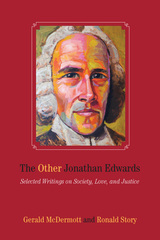
Through a selection of sermons and primary writings, McDermott and Story reveal an Edwards who preached love toward all humanity regardless of belief or appearance; who demanded private and public charity to the poor; who criticized hard-hearted business dealings as impious and socially destructive; and who condemned envy and status-seeking as anti-Christian and anti-community. This "other" Jonathan Edwards preached about grace and the love of God but also about responsive constitutional government, the iniquities of hypocrisy and corruption, and the nature of wise leadership. He acknowledged the need for national defense but left room for popular revolt from tyranny. He anticipated a millennial age of peace and prosperity and believed that people should live in the world as they would live through grace in heaven.
Jonathan Edwards was, in sum, a worldly as well as spiritual reformer who resisted the materialistic, acquisitive, and individualistic currents of American culture. For these reasons, McDermott and Story think he may have lessons to teach us today.

Cast in the form of a travelogue, Swedenborg describes having contact with the spirits of people who had lived on Mercury, Jupiter, and other planets and satellites in our solar system and beyond. This may present a challenge for those who interpret it literally, but just as it is with other of Swedenborg’s “memorable occurrences” in the spiritual world, the goal is to consider and explore the deeper insights that he reveals regarding the universal principles that unite the human with the Divine. The discussions of faith in Other Planets are framed by Swedenborg’s own Christian beliefs; however, a key takeaway for readers will certainly be the feeling that there are multiple ways of approaching belief and religious practice that can all lead to heaven.
Also published under the titles Earths in the Universe, The Worlds in Space, and Life on Other Planets, this work provides seasoned students of Swedenborg with a renewed take on the fundamentals of his theology. At the same time, this short piece opens a window onto how the people of the eighteenth century sought to integrate science and religion in ways that are still relevant and meaningful today.
READERS
Browse our collection.
PUBLISHERS
See BiblioVault's publisher services.
STUDENT SERVICES
Files for college accessibility offices.
UChicago Accessibility Resources
home | accessibility | search | about | contact us
BiblioVault ® 2001 - 2024
The University of Chicago Press









